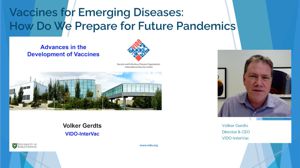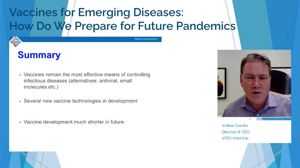Bright spots on the vaccine horizon from VIDO
Date posted: January 8, 2021
At a time when the entire world has never been more focused vaccine development, one of Canada's leading researchers in the field had some positive words on the subject for delegates to the 2021 Banff Pork Seminar (BPS).
Volker Gerdts, the director and CEO of the Vaccine and Infectious Disease Organization (VIDO) in Saskatoon, Sask. gave BPS delegates a look in the window at the fast-paced world of modern vaccine development with his Jan. 5 virtual conference presentation.
VIDO has 45 years of history in the vaccine world and today is a leader in Canada and globally. The organization has produced 10 vaccines in that time, six of those world firsts. In the current environment the team is the first in Canada to isolate the COVID 19 virus and supply it to the network frantically working on the challenge. They are the first in Canada to establish the animal model and have a COVID vaccine candidate. It is about to go to human clinical trial early in 2021.
With Canada's largest biocontainment infrastructure VIDO can work with Level Three pathogens. COVID is one of those. African Swine Fever is another.
Gerdts explained his VIDO team focuses on animal health but also the interface of animal and human health.
Getting inside viruses
Viruses can spread in many ways but in order to replicate they need to get inside cells. They have mechanisms to do that so they can take over cell mechanisms and reproduce themselves. The VIDO vaccine strategy is to try and block this.
There are two main mechanism for all vaccines to accomplish this, says Gerdts. One is antibodies which neutralize the adherence to the cell. The other is T-cells, which are cells that kill other cells.
Emerging vaccine technology
Gerdts explained several different types of vaccine technology in this rapidly-evolving world.
- Live attenuated vaccines. Pathogen is attenuated, replicates; strong immune response but safety concern.
- Inactivated (killed) vaccines. Pathogen cannot replicate; safe but requires additional adjuvants.
- Recombinant (subunit) vaccines. Only part of a pathogen. Very safe but not very immunogenic, needs adjuvants, includes toxoid vaccines, conjugates vaccines etc.
- Vectored vaccines. Relies on viral or bacterial vector. Has the advantages of both live and inactivated vaccines. Immunity against vector can be a problem
- DNA and RNA vaccines. Novel technology; very effective in experimental animals but use in humans and animals not yet fully explored.
The ideal vaccine
Whichever type the goal of vaccine development is the same, says Gerdts.
- Fast onset and long duration of immunity
- Works after single immunization
- Highly effective, prophylactic and therapeutic
- Works in all groups including niche populations
- Safe and no side effects
- Easy to store, transport and administer
- DIVA vaccine (Differentiate Infected from Vaccinated Animals)
- Vaccine goal is to mimic first exposure to the pathogen. That produces a much stronger reaction from the immune system. That is the purpose of booster immunizations. Don't allow risk below basic level of protection.
DIVA vaccines are important for modern vaccines for animals. These vaccines have markers which allow scientists to differentiate which animals are vaccinated and which have been exposed to the pathogen. This is important so that animals can be sent to other countries and that country will know these animals will not shed the disease.
New vaccine production capacity
One big new development for VIDO and Canada is the building of large scale manufacturing facilities to make these vaccines. The company will be able to produce both human and animal vaccines here with a capacity to produce 20 to 40 million doses a year. Construction of facilities will be completed in 2021 and production runs in 2022.
Futuristic thinking
Vaccines remain the most effective means of controlling infectious diseases according to Gerdts. Several new vaccines technologies are in development and the time to produce a vaccine in the future will be much shorter time period. There is also hope in new technologies such as antivirals and what are called small molecules.
Perhaps the biggest opportunity in Gerdts' view is what is driving new thinking at VIDO.
"Why wait for the disease to break out?" asks Gerdts. Even with accelerated development it means many millions of dollars in loss by the time you get a vaccine developed. Why not predict what a pathogen would look like and develop a vaccine before the disease breaks out?
We now have a much better idea of the structure of these pathogens, he says. Through developments in bioinformatics and artificial intelligence we can predict regions where they would develop. With larger facilities VIDO can study how diseases jump species.
"So we can model it in the lab what would happen in the real world and have a vaccine even before a disease breaks out. These could be stored at the World Health Organization or OIE and when a disease breaks out a plane would take off and deliver the vaccine. Even if it is not 100 percent to start with it would help contain the disease."


